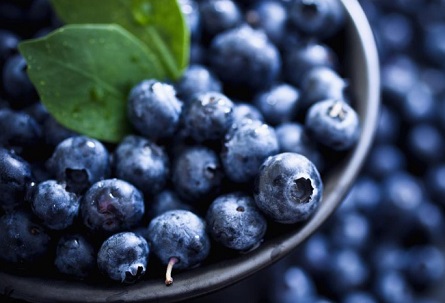Nikhil Prasad Fact checked by:Thailand Medical News Team Jun 09, 2024 1 year, 6 months, 3 weeks, 15 hours, 25 minutes ago
Herbs And Phytochemicals: A New Hope for Stroke Recovery
Stroke, one of the leading causes of death and disability worldwide, is a medical emergency that occurs when the blood supply to part of the brain is interrupted or reduced. This can be due to a blocked artery (ischemic stroke) or the leaking or bursting of a blood vessel (hemorrhagic stroke). Despite advances in medical science, effective treatments to reverse the damage caused by stroke remain limited. However, a recent study by researchers from Chonnam National University Medical School-South Korea and Jeonnam Bioindustry Foundation Biopharmaceutical Research Center-South Korea offers promising news: blueberries might play a crucial role in improving stroke recovery.
 Blueberries Could Hold the Key to Stroke Recovery
The Power of Blueberries
Blueberries Could Hold the Key to Stroke Recovery
The Power of Blueberries
Blueberries are renowned for their health benefits, packed with vitamins, antioxidants, and phytochemicals. The study explored how these tiny fruits could enhance the therapeutic effects of mesenchymal stem cells (MSCs) derived from bone marrow, particularly their extracellular vesicles (EVs).
What Are Extracellular Vesicles?
Extracellular vesicles (EVs) are tiny particles released by cells that play a vital role in communication between cells. They are involved in various processes, including inflammation, immune responses, and tissue repair. In recent years, EVs have gained attention for their potential in regenerative medicine, including the treatment of neurological disorders like stroke.
Blueberry-Treated Stem Cells: A Game Changer
In the
Herbs And Phytochemicals study, researchers treated MSCs with blueberry extract and isolated the EVs produced by these cells. They compared these blueberry-enhanced EVs (B-EVs) with regular EVs (A-EVs) to see if the blueberry treatment made a difference in stroke recovery.
The Experiment: How It Was Done
The researchers conducted experiments both in vitro (in the lab) and in vivo (using animal models). In the lab, they exposed neuronal cells to conditions mimicking a stroke (oxygen-glucose deprivation) and treated them with either B-EVs or A-EVs. They observed that cells treated with B-EVs had higher survival rates and reduced cell death compared to those treated with A-EVs.
In animal models, rats were subjected to middle cerebral artery occlusion (MCAo), a common method to simulate ischemic stroke. After inducing the stroke, the animals received injections of either B-EVs or A-EVs. The results were impressive: rats treated with B-EVs showed significant improvement in brain function, reduced brain damage, and better recovery in behavioral tests compared to those treated with A-EVs.
The Science Behind the Success
But what makes B-EVs more effective? The study revealed that blueberry treatment increased the concentration and size of the EVs. B-EVs also had a higher content of beneficial molecules such as proteins and microRNAs t
hat promote cell survival, reduce inflammation, and support tissue repair.
Gene expression analysis showed that B-EVs significantly upregulated genes involved in neuroprotection and downregulated those associated with cell death. This indicates that B-EVs have a superior ability to modulate the cellular environment in a way that favors recovery after a stroke.
Potential Clinical Implications
The findings from this study are exciting because they suggest a natural, easily accessible way to enhance the therapeutic potential of stem cell-derived treatments for stroke. If these results can be replicated in human trials, blueberry-treated EVs could become a valuable tool in the arsenal against stroke.
Moving Forward: What’s Next?
While the study presents promising results, further research is needed to confirm the effectiveness of B-EVs in humans. The scalability of producing B-EVs and the optimization of their administration need to be addressed. Additionally, understanding the precise mechanisms by which B-EVs exert their beneficial effects will be crucial for their clinical application.
Conclusion: A Berry Bright Future
The study by Jang et al. opens up new possibilities for stroke treatment, highlighting the potential of combining natural compounds like blueberries with advanced stem cell therapies. This innovative approach not only enhances the effectiveness of the treatment but also paves the way for safer, more natural therapeutic options. As research progresses, we may soon see blueberries playing a significant role in helping stroke patients recover and regain their quality of life.
The study findings were published in the International Journal of Molecular Sciences.
https://www.mdpi.com/1422-0067/25/12/6362
For the latest on
Herbs And Phytochemicals, keep on logging to Thailand Medical News.
Read Also:
https://www.thailandmedical.news/news/study-finds-that-blueberry-consumption-significantly-improves-endothelial-function
https://www.thailandmedical.news/news/berry-good-for-the-heart-the-cardiovascular-benefits-of-cherries-and-berries
https://www.thailandmedical.news/news/health-news-randomized-clinical-study-shows-that-wild-blueberry-can-improve-vascular-function-and-cognitive-performance-in-older-males-and-females
https://www.thailandmedical.news/news/pterostilbene-a-polyphenolic-phytochemical-identified-by-japanese-researchers-as-a-new-therapeutic-for-chronic-inflammatory-disorders-like-ibd
https://www.thailandmedical.news/news/flavonoids-in-plant-could-help-your-heart-s-health.
